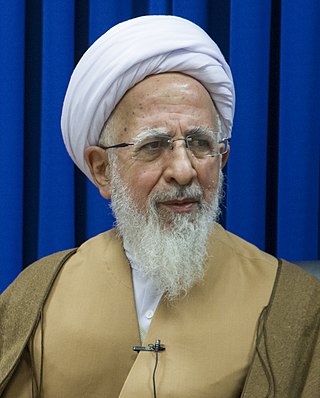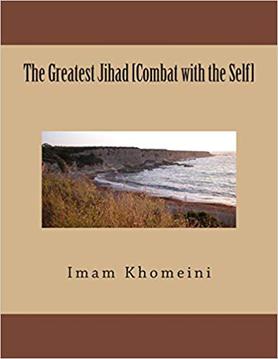
Ayatollah Ruhollah Musavi Khomeini was an Iranian Islamic revolutionary, politician, and religious leader who served as the first supreme leader of Iran from 1979 until his death in 1989. He was the founder of the Islamic Republic of Iran and the main leader of the Iranian Revolution, which overthrew Mohammad Reza Pahlavi and ended the Iranian monarchy.
The term Islamic republic has been used in different ways. Some Muslim religious leaders have used it as the name for a theoretical form of Islamic theocratic government enforcing sharia, or laws compatible with sharia. The term has also been used for a sovereign state taking a compromise position between a purely Islamic caliphate and a secular, nationalist republic — neither an Islamic monarchy nor secular republic. In other cases it is used merely as a symbol of cultural identity.

The Constitution of the Islamic Republic of Iran is the supreme law of Iran. It was adopted by referendum on 2 and 3 December 1979, and went into force replacing the Constitution of 1906. It has been amended once, on 28 July 1989. The constitution was originally made up of 175 articles in twelve chapters, but amended in 1989 to 177 articles in fourteen chapters.

Islamic Government, or Islamic Government: Jurist's Guardianship is a book by the Iranian Shi'i Muslim cleric/jurist, and revolutionary, Ayatollah Ruhollah Khomeini. First published in 1970, it is perhaps the most influential document written in modern times in support of theocratic rule.
ziyara(h) (Arabic: زِيَارَة ziyārah, "visit") or ziyarat (Persian: زیارت, ziyārat, "pilgrimage"; Turkish: ziyaret, "visit") is a form of pilgrimage to sites associated with the Islamic prophet Muhammad, his family members and descendants (including the Shī'ī Imāms), his companions and other venerated figures in Islam such as the prophets, Sufi auliya, and Islamic scholars. Sites of pilgrimage include mosques, maqams, battlefields, mountains, and caves.

The Guardianship of the Islamic Jurist is a concept in Twelver Shia Islamic law which holds that until the reappearance of the "infallible Imam", at least some of the "religious and social affairs" of the Muslim world should be administered by righteous Shi'i jurists (Faqīh). Shia disagree over whose "religious and social affairs" are to be administered and what those affairs are.

Abdollah Javadi Amoli is an Iranian Twelver Shi'a Marja. He is a conservative and Political moderate Iranian politician, philosopher and one of the prominent Islamic scholars of the Iran. The official website for his scientific foundation, Isra, states that his ideas and views have been guidance to the Islamic Republic of Iran since the 1979 Islamic Revolution, and that "his strategic and enlightening guidance" has been "extremely constructive" during the past three decades. He is known as one of the biggest critics of the banking system in Iran.
After the death of Muhammad in 632, a group of Muslims, who would come to be known as the Sunnis, believed that Muhammad's successor as caliph of the Islamic community should be Abu Bakr, whereas a second group of Muslims, who would come to be known as the Shias, believed that his successor should have been Ali ibn Abi Talib. This dispute spread across various parts of the Muslim world, which eventually led to the Battle of the Camel and Battle of Siffin. Sectarianism based on this historic dispute intensified greatly after the Battle of Karbala, in which Husayn ibn Ali and some of his close partisans, including members and children of Muhammad's household, were killed by the ruling Umayyad Caliph Yazid I, and the outcry for revenge divided the early Islamic community, albeit disproportionately, into two groups, the Sunni and the Shia. This is known today as the Islamic schism.

Khomeinism refers to the religious and political ideas of the leader of the 1979 Iranian Islamic Revolution, Ruhollah Khomeini. When it comes to descibing Khomeini's ideas, it is unsure whether "populism" or "fundamentalism" is the right concept of interpretation. Labeling Khomeinism as populism suggests that Khomeini and his movement can realize change and introduce modernity to the people. If presented as fundamentalism, however, his actions and ideas might become the trap of an ideological circle which will not be able to ever adapt modernity. In addition, Khomeinism may also refer to the ideology of the clerical class which has ruled Islamic Republic of Iran founded by Khomeini, following his death. It can also be used to refer to the "radicalization" of segments of the Twelver Shia populations of Iran, Iraq, and Lebanon, and the Iranian government's "recruitment" of Shia minorities in Afghanistan, Pakistan, Saudi Arabia and Africa. The word Khomeinist and Khomeinists, derived from Khomeinism, can also be used to describe members of Iran's clerical rulers and attempt to differentiate them from "regular" Shia Muslim clerics.
The ideas and practices of the leaders, preachers, and movements of the Islamic revival movement known as Islamism have been criticized by non-Muslims and Muslims.
Hezbollah is an Iranian movement formed at the time of the Iranian Revolution to assist the Ayatollah Ruhollah Khomeini and his forces in consolidating power, initially by attacked demonstrations and offices of newspapers that were critical of Khomeini. References in the media or writing are usually made to members of the group—or Hezbollahi—rather than Hezbollah, as Hezbollah is/was not a tightly structured independent organisation, but more a movement of loosely bound groups, usually centered on a mosque.
Following the Iranian Revolution, which overthrew the Shah of Iran, in February 1979, Iran was in a "revolutionary crisis mode" from this time until 1982 or 1983 when forces loyal to the revolution's leader, Ayatollah Ruhollah Khomeini, consolidated power. During this period, Iran's economy and the apparatus of government collapsed; its military and security forces were in disarray.

The supreme leader of Iran ), also referred to as supreme leader of the Islamic Revolution, but officially called the Supreme Leadership Authority, is the head of state and the highest political and religious authority of the Islamic Republic of Iran. The armed forces, judiciary, state television, and other key government organizations such as the Guardian Council and Expediency Discernment Council are subject to the Supreme Leader. According to the constitution, the Supreme Leader delineates the general policies of the Islamic Republic, supervising the legislature, the judiciary, and the executive branches. The current lifetime officeholder, Seyyed Ali Hosseini Khameneh known as Ali Khamenei, has issued decrees and made the final decisions on the economy, the environment, foreign policy, education, national planning, and other aspects of governance in Iran. Khamenei also makes the final decisions on the amount of transparency in elections, and has dismissed and reinstated presidential cabinet appointees. The Supreme Leader is legally considered "inviolable", with Iranians being routinely punished severely for questioning or insulting him.

Forty Hadith is a 1940 book written by Ruhollah Khomeini, the founder of the Islamic Republic of Iran. It describes his personal interpretations of the forty traditions attributed to Muhammad, the Prophet of Islam, and The Twelve Imams.

Kashf al-Asrar is a book written in 1943 by Ruhollah Khomeini, the founder of the Islamic Republic of Iran, to respond to the questions and criticisms raised in a 1943 pamphlet titled The Thousand-Year Secrets by Ali Akbar Hakimzadeh, who had abandoned clerical studies at Qom seminary and in the mid-1930s published a modernist journal titled Humayun that advocated reformation in Islam. Kashf al-Asrar is the first book that expresses Khomeini's political views.

Ruhollah Khomeini's life in exile was the period that Grand Ayatollah Ruhollah Khomeini spent from 1964 to 1979 in Turkey, Iraq and France, after Mohamed Reza Shah Pahlavi had arrested him twice for dissent from his “White Revolution” announced in 1963. Ayatollah Khomeini was invited back to Iran by the government, and returned to Tehran from exile in 1979.

Jihad al-Akbar is the lectures of Imam Khomeini in Najaf, which was published in 1991 by the institute for compilation and publication of Imam Khomeini's works.

This is a bibliography of the works of Ali Khamenei, Iran's supreme leader. Generally, his works can be classified into 4 periods of time:

Sheikh Ahmad Beheshti Persian: شیخ احمد بهشتی, is an Iranian Ayatollah. He was the president of Qom University. He represented the people of Fars Province in the first and second terms in the Islamic Consultative Assembly, as well as the third, fourth, and fifth terms of the Assembly of Experts.

Shia Islamism is the usage of Shia Islam in politics. Most study and reporting on Islamism has been focused on Sunni Islamist movements. Shia Islamism, a previously very small ideology, was boosted after the Iranian Revolution led by Ruhollah Khomeini, whose Shia Islamist policies became known as Khomeinism.










